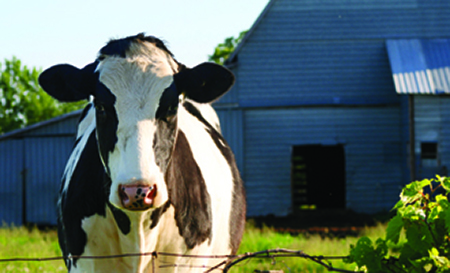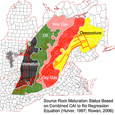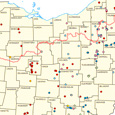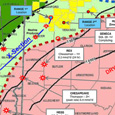Fracking fluid linked with illness in livestock?
Wednesday, December 19, 2012

SALEM, Ohio — A Cornell University study by a veterinarian and a professor of molecular medicine suggests a link may exist between fracking and illness in food animals.
However, those on the other side say the study is flawed.
Twenty-four cases
The researchers, veterinarian Michelle Bamberger and Robert Oswald, published the study of 24 cases of farmers in six shale states, including Ohio and Pennsylvania. They concluded the livestock experienced neurological, reproductive and gastrointestinal problems after being exposed to fracking fluids either accidentally or incidentally.
The article was originally published in New Solutions: A Journal of Environmental and Occupational Health Policy.
Study
According to the study, more than one-third of the cases involved conventional wells and the remainder were horizontal wells.
The most dramatic case, the study noted, was the death of 17 cattle in one hour after being exposed directly to hydraulic fracturing fluid.
In north central Pennsylvania, 140 cattle were exposed to fracking wastewater after an impoundment was breached. Seventy of the cattle died and the remainder produced only 11 calves in which only three survived.
Weight loss and stillbirths
The researchers also noted loss of weight in many of the cattle at the farms they studied. There were also deaths reported as the result of different poisonings after different animals were able to get into fracking fluids accidentally.
The symptoms included neurological symptoms and weight loss in horses, problems with dairy goats reproducing, and abnormalities in companion animals such as dogs.
Some farms self-reported adult animals suffering miscarriages or stillborn births and reported the animals had been accidentally exposed to fracking fluid.
There was limited research on the impact on dairy farms in the study.
Authors conclusions
The authors concede the study is imperfect and lacks control in the experiment. The authors also commented that because of the confidentiality agreements signed, the information available from the impacted farms was limited.
On the other side
Meanwhile, energy trade groups are rebutting the study.
Energy in Depth, a research group, commented that the report conceals names and locations, which means independent review of the claims and parties involved cannot be completed. It also points out that statements from the researchers about their findings are asserted as fact.
“With so much potential for Ohio in the continued development of our state’s oil and natural gas resources, it is imperative we have an open, fact-based conversation based on scientific evidence rather than hyperbole and predetermined assumptions,” said Dan Alfaro, spokesman for Energy in Depth. “This study fails to meet that standard.”
No scientific merit
He said the assumptions made in the study are not based on any scientific merit, instead, they use unverifiable, anecdotal information to fit a predetermined narrative, one that is in conflict with a number of studies on the same issue — including four recent studies from Texas and neighboring Pennsylvania.
“The authors themselves acknowledge the paper is not a study of the health impacts of specific chemical exposures related to gas drilling, and is, in fact, an imperfect study,” said Alfaro.




